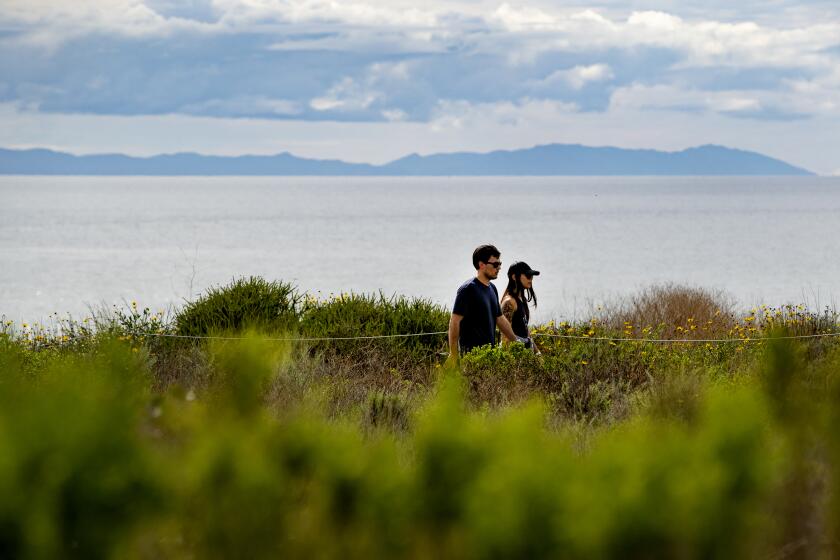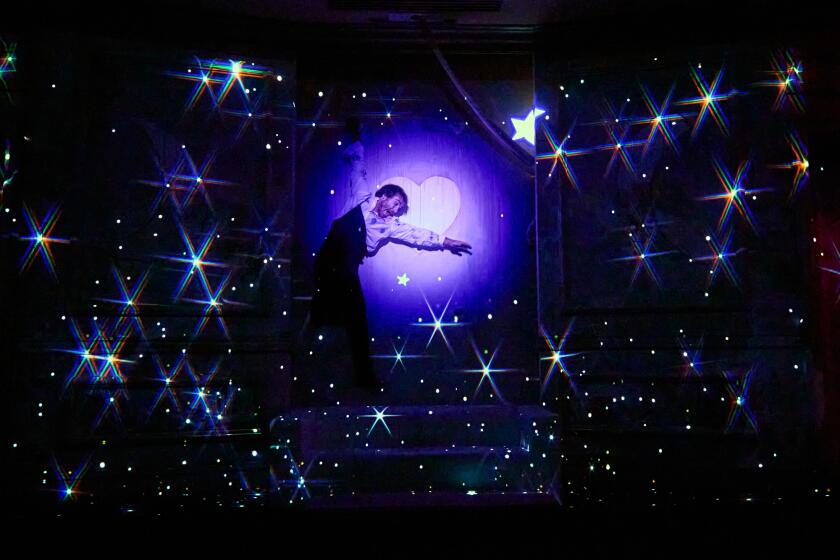Wanderlust
Put aside the oysters and figs and forget Spanish fly--unless you’re traveling to Spain to get it. Travel is the ultimate aphrodisiac. Think train tunnels, frequent fliers in the Mile High Club and the pulsing vibrations of public transport. And all that’s before you even get to where you’re going. There’s never quite enough room in the traveler’s bags for personal histories, emotional commitments or even normal codes of behavior. The traveler can be whomever he or she pretends to be, and that often means wild and crazy, young and free. This gets people attending interstate business meetings and academic conferences into enough trouble. When the traveler crosses the border into foreign cultures, that trouble is doubled: In the calculus of travel, exoticism equals eroticism. Then, when the time for coming has gone and the time for going has come, the traveler packs his or her memories along with other souvenirs and slips away.
Francis King had a hot affair in Venice with a gondolier, despite the fact that each could barely speak the other’s language. When he returned to England, the gondolier wrote to him to say that he was saving up the money to join him there. “At first I was thrilled by the prospect,” King writes. “But then, as the days passed, I began to be increasingly troubled by doubts. Would he be allowed through immigration? And if he were allowed through, what would he then do? I could hardly expect my mother to put him up. . . . “
As a rock musician I know put it, it’s probably best for everyone involved if “what happens on the road stays on the road.” On the other hand, that may work for musicians, but when writers are involved, if there’s kiss, you know there’s going to be tell. I’m glad for their indiscretions.
The world would seem a slightly less ridiculous and wonderful place if, for instance, Richard Rayner hadn’t told us how, after making love with a Playboy bunny in L.A., unable to sleep, he went into the bathroom and tried on her costume. “I had to stretch the band to make the velvet ears fit. . . . The green stilettos pinched less than I would have expected. I hadn’t realized Barbara had such big feet.” Back in the bedroom, he watches her sleep for a while. “Outside a police siren went whoo-whoo-whoo. I fingered the pom-pom on my arse. I was in Los Angeles, I was transformed, I had Linda Jaivin is the author of three novels, including “Eat Me” and “Rock ‘n’ Roll Babes From Outer Space,” as well as a collection of essays, “Confessions of an S&M; Virgin.” finally arrived: Bunny Richard.”
“Erogenous Zones: An Anthology of Sex Abroad” reads like a kind of literary who’s who whoo-whoo. King and Rayner are but two in a long list of well-known non-innocents abroad that also includes Casanova, Frank Harris and Henry Miller, as well as some of the less usual suspects, like Doris Lessing and Katherine Mansfield. We glimpse James Boswell taking a break from his hilariously inept pursuit of the women of Italy to debate literature and philosophy with a Catholic acquaintance.
We witness Gustave Flaubert’s surprise and pleasure at learning that in Egypt, “[o]ne admits one’s sodomy, and it is spoken of at table in the hotel.” We discover Graham Greene in Vietnam accepting an opium pipe but turning down the “attractive, dirty, slightly squint-eyed” girl who prepares it for him. Mercedes de Acosta, meanwhile, relates the lengths to which Greta Garbo could go when she didn’t want to be alone. Most indelible, to my mind anyway, is the image of Paul Theroux making love to an African leper in the presence of her blind grandmother while a drumming ceremony commemorating the departure of a white Catholic priest reaches a frenzy point outside their hut.
For all the disparate voices represented in these pages, collectively they suggest that though the age of empire is over, that of foreign conquest may never end. There is the apparently irresistible notion running through many of these excerpts that the most effective way to pierce the mysteries of other cultures is through more literal penetrations--carnal knowledge as the key to cultural knowledge.
Take this passage from Christopher Isherwood’s autobiographical novel “Christopher and His Kind: 1929-1939”: “Most importantly, Bubi had to be The German Boy, the representative of his race. . . . By embracing Bubi, Christopher could hold in his arms the whole mystery-magic of foreignness, Germanness. By means of Bubi, he could fall in love with and possess the entire nation.”
One of the sadder themes is the love-you-and-leave-you aspect of the amorous traveler’s tales. I can’t get out of my head the heartbreaking image of Charles Warren Stoddard urging his hired sailors to paddle his canoe as fast as they could away from the South Sea island where he’d been lingering, while his devoted young lover, “dear little velvet-skinned, coffee-colored Kana-ana,” a boy he’d described as made of “half sunshine,” plunges into the sea after him. Fighting the breakers, screaming his name in distress, Kana-ana tries in vain to catch up with the canoe. “I believe in my heart I wished the paddles would break or the canoe split on the reef, though all the time I was urging the rascals forward; and they, like stupids, took me at my word.”
“Erogenous Zones” is not, strictly speaking, an erotic reader. Some of its passages heat up like Dom Moraes’ compartment on the Orient Express when, for fear of spending “some considerable time inside a Communist prison” for carrying banned pornography across the Yugoslav border, he stuffs Harris’ “My Life and Loves”--all five volumes--into the train’s ventilator. Others have an anthropological coolness, even offensiveness about them.
Geoffrey Gorer writes in the 1930s of West Africans that “the smooth texture of their skin which affects the eye like worked marble or bronze (my fingers were always surprised to find Negro bodies warm and yielding)--makes them appear as much ‘objects’ as ‘people,’ and my attitude is consequently far more detached. . . .”
Alongside the creepy sub-current of racial fetishism that runs throughout many of the passages in “Erogenous Zones” is another, equally disquieting motif. Andre Gide cherishes memories of “the beautiful swooning body of the child” he enjoyed while on a Middle Eastern adventure. Paul Gauguin, who was 43 when he first went to Tahiti, writes of taking a 13-year-old Tahitian girl, whom he describes as a “large child, slender, strong, of wonderful proportions” with “two swelling buds” for breasts, as his wife. Notions of right and wrong surrounding issues like surprising one’s fingers with “Negro” bodies and what we would call pedophilia are different today than they were in the past. It would have been useful if editor Lucretia Stewart had organized her selections chronologically as well as geographically or had simply put the original dates of publication up front with the title and author.
Most of these affairs are so briefly glimpsed, it’s as though we were peering through a keyhole. The excerpts give us no inkling of the fates of the “native” inamorati. Only Mirella Ricciardi takes us to that difficult place. “When Shaibu crossed my life,” she says of the Kenyan lad who became her lover, “he was sixteen years younger than I. I was a colonial, deeply impregnated with colonial taboos. He was a Muslim whose code of religion and ethics was as refined as my own, if not more so.” When she confides to an Italian friend that things were heating up between them, the friend warned her to “be careful”: “You will upset the natural ecology of his life, while you yourself have nothing to lose.”
In the end, when it’s time for Ricciardi to return to Europe, Shaibu, devastated, begs to go with her. Even his parents plead for her to take him, saying he will “die” without her. “But it was painfully obvious,” she writes, “that this was impossible. Our worlds were too far apart and there was no longer any place for him in mine.”
When a year later, she returns to find him, she’s chilled to discover that both his parents and her Italian friend had been right. Shaibu was a destroyed man who lay all day in his hut, his once beautiful features puffy and almost unrecognizable with the effects of drink. Guiltily, she reflects that in the two years they’d been together, “I had found myself, but he had lost himself. Unwittingly I had torn him from his world and made him a victim of mine.”
One of my favorite chapters is by Duncan Fallowell, who more or less accidentally (he’s gay) picks up a female Russian prostitute in St. Petersburg. In the course of this awkward adventure, she tells him she hates writers. “They never stop writing,” she complains. When she informs him she can charge up to $200 for her services and he reveals that he only has $27, she exclaims again, “Oh God, I hate writers!” Then, she confesses: “Once upon a time I had an affair with a writer. . . .” Fallowell writes, “She stares down at the coffee, stirring it with a spoon, the memory stinging still.” I gather that in this, she’s not alone.
Sign up for The Wild
We’ll help you find the best places to hike, bike and run, as well as the perfect silent spots for meditation and yoga.
You may occasionally receive promotional content from the Los Angeles Times.



